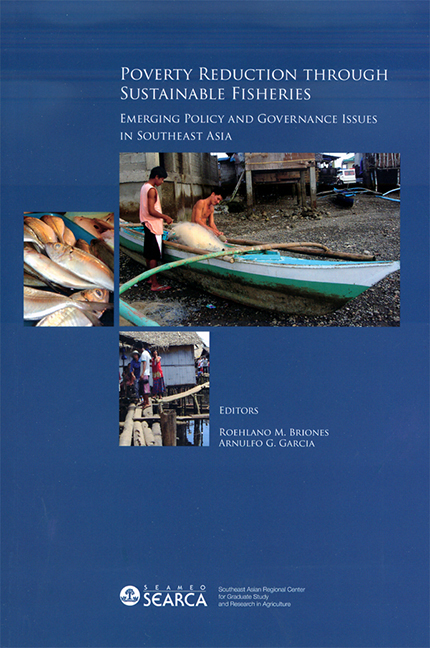 Poverty Reduction through Sustainable Fisheries
Poverty Reduction through Sustainable Fisheries Book contents
- Frontmatter
- Contents
- Figures
- Tables
- Foreword
- Acknowledgments
- 1 Introduction and Synthesis
- 2 Fish and the Poor
- 3 Fish and the Poor: The Case of Cambodia
- 4 Changing Demand and Supply Structure of Fish in Asia: Past Trends and Future Projections
- 5 Regional Economic Integration of the Fisheries Sector in ASEAN Countries
- 6 Technology Policies for Capture Fisheries and Aquaculture in Southeast Asia
- 7 The Status, Current Trends and Future Directions for Production and Technology of Fisheries in Southeast Asia
- 8 The Seafood Supply Chain and Poverty Reduction
- 9 Strategy for the Empowerment of Aquaculture Fish Farmers in Indonesia
- 10 Status of Coastal and Marine Resources: Implications for Fisheries Management and Poverty in Southeast Asia
- 11 Property Rights and Institutional Arrangements in Southeast Asian Fisheries
- 12 Regional Cooperation in Aquatic Resource Management for Southeast Asia
10 - Status of Coastal and Marine Resources: Implications for Fisheries Management and Poverty in Southeast Asia
Published online by Cambridge University Press: 21 October 2015
- Frontmatter
- Contents
- Figures
- Tables
- Foreword
- Acknowledgments
- 1 Introduction and Synthesis
- 2 Fish and the Poor
- 3 Fish and the Poor: The Case of Cambodia
- 4 Changing Demand and Supply Structure of Fish in Asia: Past Trends and Future Projections
- 5 Regional Economic Integration of the Fisheries Sector in ASEAN Countries
- 6 Technology Policies for Capture Fisheries and Aquaculture in Southeast Asia
- 7 The Status, Current Trends and Future Directions for Production and Technology of Fisheries in Southeast Asia
- 8 The Seafood Supply Chain and Poverty Reduction
- 9 Strategy for the Empowerment of Aquaculture Fish Farmers in Indonesia
- 10 Status of Coastal and Marine Resources: Implications for Fisheries Management and Poverty in Southeast Asia
- 11 Property Rights and Institutional Arrangements in Southeast Asian Fisheries
- 12 Regional Cooperation in Aquatic Resource Management for Southeast Asia
Summary
ABSTRACT
The coastal and marine resources in Southeast Asia are unequalled in density and diversity by those in other parts of the world. Fisheries from the region supply about 10 per cent of global fish catch. Over the last 20 to 30 years, these resources have been under threat of overexploitation, destruction, and extinction in some areas. This paper reviews the status of the most important coastal and marine resources in Southeast Asia; and highlights the primary threats to their sustainable use and existence. The dependency of coastal human populations on near-shore fisheries and resources is discussed in relation to the economic consequences of poor management of these resources. Finally, promising management strategies and governance systems from the Philippines are explored in terms of their implications on future research topics relevant to building sustainable fisheries. Research topics suggested include: 1) Continuous monitoring of the biophysical status of coastal resources so that policy makers are aware of the progress (or lack thereof) of protection and rehabilitation efforts; 2) Cost-benefit analysis of the management of coastal resources and fisheries; 3) Investigating the causes of resource degradation from pollution and other impacts on the coastal environment; 4) Understanding the tradeoffs between small and large scale fisheries in Southeast Asia; 5) Testing models for integrated coastal and ecosystem-based management including fisheries and economic development; 6) Testing ways to develop alternative economies for small-scale fishers that reinforce protection and management; 7) Augmenting and refining the integrated paradigms for management that put small-scale fisheries at the centre of a complex management problem; and, 8) Learning more about how to build capacity for management.
INTRODUCTION
The coastal and marine resources in Southeast Asia are unequalled in density and diversity by those in other parts of the world (Figure 10.1). It is well known that these tropical coastal areas are rich in coastal and marine ecosystems comprised of coral reefs, mangroves, estuaries, beaches, and their associated fisheries. Fisheries from the region supply about 10 per cent of global fish catch.
- Type
- Chapter
- Information
- Poverty Reduction through Sustainable FisheriesEmerging Policy and Governance Issues in Southeast Asia, pp. 199 - 232Publisher: ISEAS–Yusof Ishak InstitutePrint publication year: 2008
